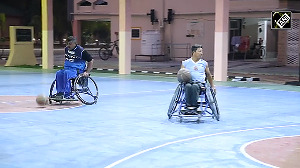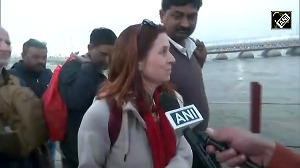Having won the Rajiv Gandhi Khel Ratna, the country's highest sporting honour, ace cueist Pankaj Advani on Thursday said he now has his sights on the Doha Asian Games.
Pankaj, who was conferred the Khel Ratna by President A P J Abdul Kalam on Tuesday, spoke on his future plans, and said despite becoming the youngest World billiards champion last year, there are areas he still needs to work upon.
''I have no plans to turn pro in snooker for now. The circuit is centered in England and I would have to shift there for at least eight months to become a pro, which is not possible for me. Adjusting there is tough despite the fact that the facilities and competition is really good,'' Pankaj said.
The 21-year-old, who became the second youngest to win the country's highest sporting honour, meanwhile, is now preparing for the Asian Games in December.
Pankaj said the award has come at just the right time and given him the motivation to improve his performance.
''My next target is the Asian Games. I am concentrating on that for now, and having won the Khel Ratna I know the expectations are likely to be lot more. But I feel motivated by all the accolades and I am looking forward to improve myself,'' he said.
Asked if there are any weak areas he is working upon, Pankaj said despite all his achievements, room for improvement is always there.
Having just compeleted his graduation in commerce, Pankaj said he always balanced his studies with his passion for billiards and has never found it difficult.
''When I first started playing billiards, there used to be pressure to handle studies, but gradually I adjusted to it. After all, there are 24 hours in a day and there is a lot one can do.
"I always told myself that I had to score at least first division marks, but, thankfully, I have always managed to do better,'' he added.
A visibly tired Pankaj, who came straight to Rashtrapati Bhavan after a 30-hour flight from the United States, said the exhaustion had worn off after winning the award and he was feeling refreshed.''The excitement of recieveing the award has kept me going. I was very tired yesterday but the sound of the National anthem in the background as I recieved the award refreshed me. It was such a proud moment that being tired had no effect on me,'' he said.
The ace cueist, who beat competition from Mahesh Bhupathi and Rahul Dravid to claim the Khel Ratna, said there is a system in place to choose the awardees and he was happy to have won it on his own merit.
''I think these awards are given on the basis of championship wins and I think according to the system in place I got points for winning the World Championship. And I am very happy to win it on merit,'' he explained.
Pankaj also expressed happiness at Anuja Thakur becoming the first woman cueist to win the Arjuna Award and said it augurs well for the future of the sport in the country.
''This is very good for the game. Obviously, it's about individual performances, but two people from the same sport being recognised simultaneously is good for the future. In the end, this means that the sport has won,'' he said, praising his female counterpart's achievement.
The former Arjuna awardee said more than the wins, it were the loses that had helped him become a better sportsperson and felt that the challenge from Australia and England was the toughest he came across.
''Matches that you lose make you better. When I lose close matches, it helps me prepare better for the next event. The losses make you a stronger person. But, that apart, competition from Australia and England is the toughest, because the game is centered there,'' he said.
An admirer of ace cyclist Lance Armstrong, Pankaj said the American's strength of character inspires him despite the drug controversies that have plagued his career.
''I idolise Lance Armstrong. I think his strength of character is inspirational. And, at a personal level, I don't think he would take any performnce enhancing drugs. I think he is a champion and his life is inspiring,'' the cueist said.
Pankaj felt that to make billiards more spectator-friendly, it is important to take the game to grassroot level and introduce it in schools.
''Professional marketing is needed to promote the game. But, at the same time, the game has to be promoted at the grassroot level.
"We have to take it to schools and having seen the children's reaction to the game in some schools in Madhya Pradesh. I can tell you the youngsters will take to the game,'' he said.







 © 2025
© 2025